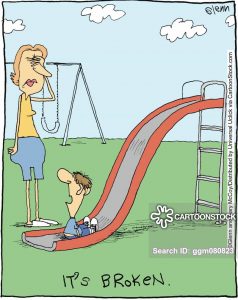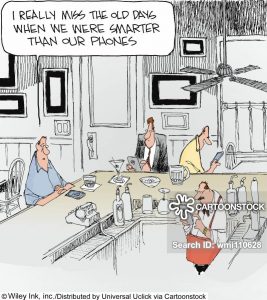
Both of my narratives are inspired from “The Future of Digital Literacies” podcast (2020). In the conversation, Doug Fisher describes how the multiple intelligences of Howard Gardner are dated and should be replaced with new intelligences; playground intelligence and technological intelligence.
My first narrative explores playground intelligence. When studying this intelligence, scholars will ask the questions, “how am I playing and how am I being played?” (Fisher, 2020).
| Cole | “MOM! If I play outside can I get my iPad back? Puuuuulllleeease!!” |
| Mom | “You need some fresh air. You have been sitting all day. We will discuss iPad privileges in a bit. Go run around.” |
| Cole | Internal monologue:
“Great, what am I supposed to do out here? Get my hands dirty playing in the sand? Let’s try this shiny tall thing. |
| *Cole plants himself at the bottom of the slide* | |
| Cole | It’s broken. Now what?
“MOM! Can you show me a YouTube video for using this thing?” |
| Mom | “Put those gaming tricks to good use sweetie! You can figure it out yourself!” |
| Cole | “But I’m not gaming!”
What tricks can I use? Uggghhh! I’m bored. Nothing is shooting at me or chasing me. I wish I had my VR headset. |
| *3 minutes later* | |
| Cole | “I’m coming back inside! I won’t use my iPad, just my small robot.” |
Now this scenario might seem set more in the present than the future, however, in the future, scholars will be studying this behaviour as “playground intelligence.” They will be looking at children’s’ ability to remove themselves from the digital world and switch their brains to outside, imaginative play and problem solving. How do they adapt when they don’t have an immediate answer to a question or a ‘how to’ video? Do they know how to transfer their knowledge from online to real life? And if they do, are they effective in doing so?

My second narrative explores technological intelligence. Do students have the wisdom to evaluate digital content and its impact on them? (Fisher, 2020). As augmented reality becomes more prevalent in our educational sector, it will drive our desire to learn more.
| Eli | “Dad, like my new glasses?” |
| Dad | “Yeah! Stylish! I didn’t know you needed glasses for school?” |
| Eli | “I don’t need them for seeing, I need them for learning” |
| Dad | “Well, yeah. That’s the point of them right? So you can see the board?” |
| Eli | “What board?” |
| Dad | “Oh sorrrrrry…. The projector.” |
| Eli | “No, I can see the projector just fine.” |
| Dad | “Then why do you have glasses?” |
| Eli | “For my learning! Geezzzz!” |
| Dad | “I’m lost.” |
| Eli | “Ask me a question I don’t know.” |
| Dad | “What is the capital of Sweden?” |
| Eli | “Ok Google, what is the capital of Sweden?” |
| *A map appears on Eli’s right lens, highlighting Stockholm* | |
| Dad | “Wow! The map is superimposed on your lens?” |
| Eli | “Ok Google, what does ‘superimposed’ mean?” |
| Dad | “I get it, I get it. You need them for learning.” |
In the future, scholars will be studying students’ ability to gain wisdom with knowledge being so readily available to them. Fisher mentions that students can access knowledge immediately, but that’s not wisdom. Wisdom grows over a lifetime (2020). In 30 years, will wisdom be obsolete from humanity’s hunger for more knowledge and power?
Reference:
Leading Lines (2020). Episode 60: The Future of Digital Literacies. Retrieved 2021 from https://soundcloud.com/leadinglines/episode-060-future-of-digital-literacies-faculty-panel